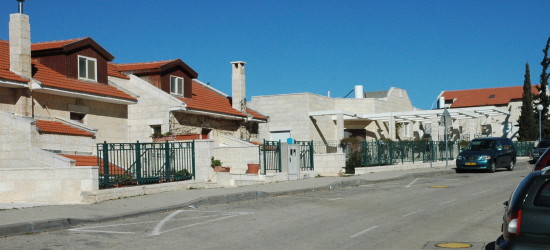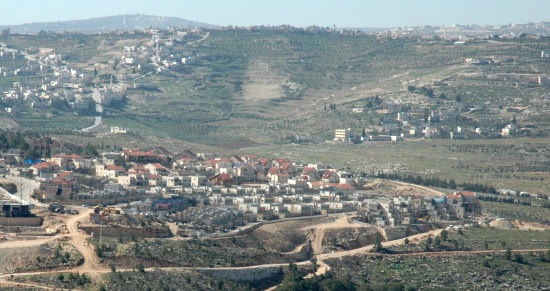The HOAs of Israel
What is a West Bank settlement? If you read the press, it is a place where Israeli Jews have moved in and stolen the land of Arabs in order to occupy their land unfairly. It is a place where Arabs are forbidden, where apartheid has been established against the indigenous population.
Not only are these statements false, they actually turn reality on its head.
In my two visits to Israel I have stayed or visited four different West Bank settlements, and in each place my first impression was that I was visiting a typical American gated community, a suburban community run by a home-owner-association (HOA). You enter by driving through a gate where an attendant waves at you as you go by. He doesn’t stop you, because he either knows you or he has profiled you and sees no reason to ask you any questions. Once inside the roads wind about, passing individual homes or apartments. At the center of the community is a recreation center, often with a pool and library, where events are held and people go for entertainment.

The gated community of Alon Shvut, south of Jerusalem in the West Bank.
Granted, there are differences. In Israel the gated communities often have both private homes and apartment buildings, something you rarely see in the U.S. Sometimes Israel HOAs are almost all made up of apartment buildings, packed close together along with a main shopping street. And in Israel the gate attendant pays much closer attention, and can and will forbid entry if he feels it necessary. In the states the gate is almost always merely for show, and accomplishes little but provide residents a false sense of security.
Still, the similarities are striking. The settlements I visited were all alike in this way, a collection of homes and apartments, all built at the same time and then sold or rented out to those that were looking for a place to stay.
Moreover, the land was not stolen, nor was anyone evicted against their will to obtain it, as is often suggested by the press and by those who oppose the existence of Israel. Instead the land was routinely purchased or obtained in as legal and as just a way as possible. There is no doubt that the ownership title of all the land in the West Bank is under dispute. What is very clear is that practically nothing was ever taken from anyone — except in those cases where Israelis were evicted by force by their own government.
The land for all Israeli West Bank settlements was obtained in one of two ways: either the land was unoccupied so that Israeli settlers could homestead it, or it was purchased from its Arab owners. In both cases, the Israelis have been very careful to document title as best as possible. Because Israel had been part of the Ottoman Empire until the end of World War I, to search the oldest land records you have to go to Istanbul, Turkey, where those records are still kept. More recent land records are kept in Ramallah, a West Bank city under the control of the Palestinian Authority (PA) since the signing of the 1993 Oslo Accords. Unfortunately, since the signing of those accords, the PA has made those records unavailable. Beforehand, however, they were used to identify whether a piece of land was owned by someone or not.
In the case of land purchase from Arabs, this has become increasingly difficult as the decades have passed. It is now illegal for an Arab to sell land to an Israeli, with the punishment death for doing so. Thus, when Arabs do sell land (it does happen repeatedly) the transaction is usually done illicitly. In some cases, the Arab seller has been known to take advantage of this situation and sell his property multiple times. In other cases, the Arab seller demands and gets as part of the deal transportation for himself and his family out of the country in order to protect their lives.
Most of the time, however, Israeli West Bank settlements are built on empty land that has been documented in land records as having no ownership or occupant. The Israelis literally homestead it, turning something useless and empty into a thriving community.
Thus, if we were willing to put aside ethnic and political issues, we would see that most of the land disputes in Israel fall under the very simple issue of a disputed title ownership. For example, during the period from 1948 to 1967 when Jordan controlled the West Bank, Jordan supposedly gifted some of the unclaimed tracts to private individuals. Though these gifts are not well documented and were often never claimed by their recipients even during the time Jordan controlled the land, they are often used today to try to discredit the ownership rights of present-day Israeli settlers. In a normal world, these disputes as well as any land purchases or homesteading disagreements could easily be solved by either a contractual agreement and the exchange of cash or by a simple ruling in court. Instead, the ownership questions are used as a hammer against Israeli settlers, who in many cases have lived on this land now for as much as six decades.
Then there is the question of why Israelis even settle on this land. The assumption I and most people make is that they are there to gain and solidify their possession of the West Bank, for both political and ideological reasons. While partly true, this is actually not the main reason why people buy homes or rent apartments in these HOAs. Instead, they do it for basic economic reasons. Because the title of the West Bank is under dispute, and because it is also a place where there is a recognized threat of violence, the land is simply cheaper to buy. Renting an apartment in Jerusalem or in Israel is far more expensive. So is buying land. If you want to live near Jerusalem but don’t have a lot of money, living in a West Bank gated community is a smart and economical choice.
In the end, this effort by Israelis to find affordable housing raises the value of the West Bank land, which has resulted in an increase in construction by both Israelis and Arabs. The image below, taken from the hilltop fortress of Herod in the West Bank just a few miles south of Jerusalem, shows both an Israeli settlement (with red roofs) and two Arab developments close by in the background, along with a great deal of other construction. And this image is very typical of the countryside surrounding Jerusalem in the West Bank.

What a concept. A free market flourishes, people build homes and businesses, land values increase, everyone is better off, and wealth ensues.
Tomorrow I will take us all sightseeing, and describe how the only apartheid being imposed in the Middle East is against Jews. Just like in NAZI Germany, the Arabs have imposed rules — with international sanction — that forbid Jews from visiting certain areas of the Middle East.
On Christmas Eve 1968 three Americans became the first humans to visit another world. What they did to celebrate was unexpected and profound, and will be remembered throughout all human history. Genesis: the Story of Apollo 8, Robert Zimmerman's classic history of humanity's first journey to another world, tells that story, and it is now available as both an ebook and an audiobook, both with a foreword by Valerie Anders and a new introduction by Robert Zimmerman.
The print edition can be purchased at Amazon or from any other book seller. If you want an autographed copy the price is $60 for the hardback and $45 for the paperback, plus $8 shipping for each. Go here for purchasing details. The ebook is available everywhere for $5.99 (before discount) at amazon, or direct from my ebook publisher, ebookit. If you buy it from ebookit you don't support the big tech companies and the author gets a bigger cut much sooner.
The audiobook is also available at all these vendors, and is also free with a 30-day trial membership to Audible.
"Not simply about one mission, [Genesis] is also the history of America's quest for the moon... Zimmerman has done a masterful job of tying disparate events together into a solid account of one of America's greatest human triumphs."--San Antonio Express-News


Q: What is the firearms policy for the citizens in Israel?
Does everyone who wants to carry, carry ?
Are there “no gun” school zones ?
7 Round magazine laws ?
Let me try to answer although I am not a spokesman for policy or a lawyer:
What is the firearms policy for the citizens in Israel?> There are two major groups that can carry firearms: 1) Security 2) Private Citizens.
Security includes soldiers, police, school guards, and the like. Private citizens includes everybody else.
In order for security personnel to get firearms depends on their job description. Not all soldiers, for instance, are allowed to carry or posses firearms although they are certified for such.
Private citizens may carry firearms only if they obtain a permit. Getting a permit is a long and arduous process and is not usually encouraged.
Once you have the permit you have to be recertified every, I think, 3 years. This includes safety training and proficiency on the range. If, for instance, you cannot hit the target with the required spread, no certification, no firearm.
In general the laws and procedures for firearms are pretty stringent.
Are there “no gun” school zones?> the only guns allowed in schools are the ones with permits, being school guards or school personnel.
Any time you show up with a firearm at the wrong time or the wrong place, you may be mistaken or a terrorist, this is not good, so people who carry firearms are extra careful. When you do show up with a firearm at the right time and in the right place you save lives, as has been proven multiple times.
7 Round magazine laws ?> There are no 7 round magazine laws. As a private citizen you can only purchase a limited amount of ammunition per year. There is no limit at a certified gun range.
All this is applies to security or private citizens whether in the occupied territories or not.
Thank you, very interesting.
I assumed that all Israel’s were armed at some level.
What about keeping a firearm in your house for personal / family protection.
If you have a permit you can keep the firearm in your house, but under lock and key.
Bob, thanks so much for this piece – most of us have never been to Israel, nor had a chance to see or hear first-hand what the “Settlements” issues are about. Unfortunately, we cannot always depend on our media folks to portray things accurately. I enjoyed seeing what one of these gated communities looks like – as you said, it looks not too different from some you’d see in suburban areas here. I think you hit the nail on the head when you said the #1 reason people were moving there was economic – those on the Left seem immune to the logic of economic issues as the driving force behind so much of human behavior…
While many individual settlers are only thinking of economics, there is clearly an overt attempt overall to establish israeli presence throughout the West Bank. The government has encouraged them. Remember when Sharon went against the court ban? While the legal titles of the west bank is in dispute, this land will clearly be Palestine eventually. So it is nothing less than a finger in the eye to build there, since it takes land from future Palestine.
You also ignore the land seizures near the security line. Many olive groves, not bare land.